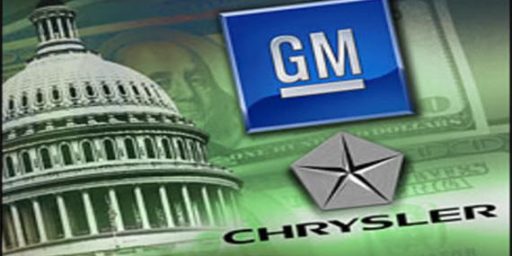GM Considering Alliance with Renault and Nissan
General Motors has had some financial issues for some time now, and with the slump in SUV sales things have looked rather bleak. But one of GM’s responses appears to the possibility of an alliance with Renault and Nissan.
General Motors Corp. said Friday that it would begin talks with Renault SA and Nissan Motor Co. about potentially joining in a worldwide alliance, bowing to pressure from activist shareholder Kirk Kerkorian, who is crusading for change at the struggling auto giant.
That GM would even consider an alliance is a reflection of both the company’s weakened position and the harshly competitive nature of the globalized auto industry. With too many carmarkers competing for customers spread around the world, alliances and consolidation are both increasingly becoming part of the picture. Indeed, the decision by GM—the world’s largest car company—to look at a partnership with a European and Japanese rival has analysts speculating that other automakers will have to consider their own options.
Of course, this is just a possibility at the moment as it seems there is some reluctance on the part of many at GM.
Any deal would hinge on GM seeing some significant cost savings, analysts said. Arguing against that is a mixed history of alliances between auto companies.
GM moved forward because it was obligated to listen to Kerkorian, who owns 9.9 percent of the company through his Tracinda Corp. and pushed for the talks. A successful turnaround for GM, or even just buzz over a deal, could mean a windfall for Kerkorian in the form of a higher share price for GM. Whether GM Chief Executive Rick Wagoner is thrilled by the idea or not, he will meet Friday with Carlos Ghosn, CEO of both Renault and Nissan.
Still there are some good possibilities for all sides in such an alliance,
One likely scenario, according to observers, is that GM, Renault and Nissan will discuss joint ventures. “Joint ventures would make sense and would represent a massive savings,” said Dave Healy, analyst with Burnham Securities. “They could do a joint venture in diesel engines, which are in desperately short supply in Europe, or in hybrids, where Toyota is miles ahead of both and they need to catch up.”






I sold as as a second tier supplier into Chrysler (and GM, Ford and others) after the Daimler Chrysler merger. It was not a happy marriage in that the corporate cultures were very different. I am currently seeing a similar cultural mismatch in a current Asian/European merged company I am partnering with.
The mind boggles to think of a Japanese, French, GM cultural merger.